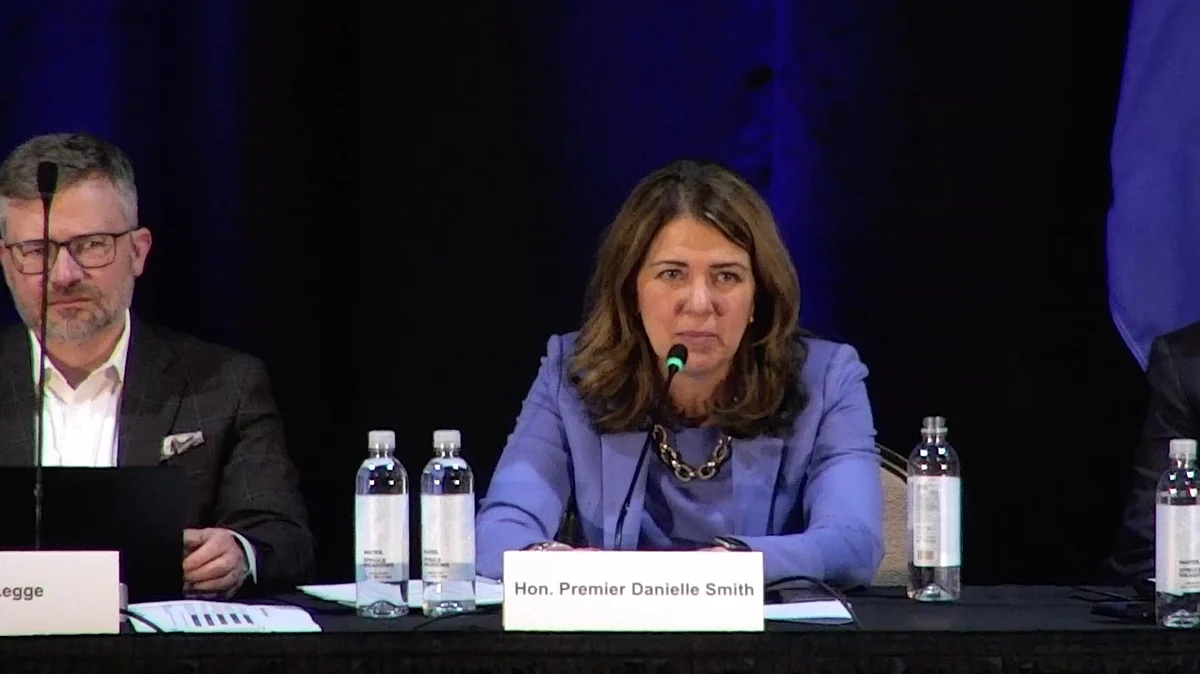By David Wiechnik
Copyright westernstandard

Premier Danielle Smith and the Alberta Next panel wrapped up their cross-province tour on Monday night at the Spruce Meadows Equi-Plex, just south of Calgary.It was the tenth and final town hall held since July, where they spoke to Albertans across the province about the current relationship with Ottawa.The panel has pitched six ideas that could later become referendum questions, including immigration reforms, leaving the Canada Pension Plan (CPP), creating a provincial police force, and equalization payments, among others.While results from the Alberta Next online poll haven’t been released yet, but crowds at the town halls have overwhelmingly voted in favour of them in straw polls conducted at each event, and Monday’s edition was no exception, as the crowd of around 1,100 was predominantly in support of the topics discussed.“This is about giving Albertans a voice,” Smith told the audience.“Regardless of what each of us believes about these issues, we must be able to respectfully debate them. If we do that, our province will come out stronger and freer than ever. So, I will put my faith in Albertans to find the right path. I trust you.”The evening featured a number of pointed questions regarding the topics.A Grade 12 student pressed Smith on education funding, noting that overcrowded classrooms are hindering the learning experience.“I believe Alberta should keep more of our money to invest in what matters here, like schools,” she said to loud applause.Smith addressed the recent news that the Alberta Teachers’ Association (ATA) has rejected a tentative agreement with the provincial government by an 89.5% margin and looks likely to strike on Oct. 6.“We are disappointed,” Smith stated.“We have heard that the issue teachers are experiencing is around complexity in the classroom, classroom size, as well as the number of newcomers who have English as a second language in the classroom.“So we’ve got some things that we’ve got to talk about with the teachers’ union at the table, around getting more educational assistants and building more schools. You can only build them at the rate you can construct. So we’re hoping to find some agreement on that, but we’ll have more to say about that tomorrow.”.Standing-room-only crowd cheers for Smith’s Alberta Next panel in Airdrie.Some attendees attacked Smith and the panel.“We should be able to talk about anything we want,” said one crowd member.“We don’t want an Alberta Pension Plan… we want publicly funded health care and education.”Another man confronted the panel over the provincial government’s policies that he said had led to a possible teachers’ strike before his microphone was cut off.Questions about pipelines, pensions, and equalization dominated much of the evening.Asked about updates on the Keystone XL pipeline, Smith said she supports an “all of the above” approach to pipelines, arguing Alberta must expand its energy access “north, south, east and west.”“The Americans have expressed an interest in restarting that conversation,” Smith said.“I know that there are several pipeline companies that are looking at ways of increasing the amount that goes south by up to a couple of million barrels a day. I think if we want to expand our markets, though, we need to also build them east and west. So that’s what I’ve been advocating for all along.“If you want to develop the revenues in order to be able to pay for the things we all care about, such as education, healthcare, and infrastructure, you have to generate the wealth to be able to do it. We’ve been going down a path for the past ten years in which the government in Ottawa has believed that they could just create money out of thin air. It’s led to the inflation crisis… It’s led to fleeing capital.”.Alberta Next panel floats equalization and senate reform in Lloydminster .The provincial pension plan proved an especially hot topic. Some attendees demanded assurances that Alberta seniors would be protected if the province left the CPP.One woman voiced anger at the idea of Ottawa paying Old Age Security to immigrants who had not contributed, while another accused the province of preparing to seize her “individual CPP account.”Smith countered that Alberta workers already contribute more to CPP than seniors receive back, leaving a $3-billion surplus that could fund a provincial-run plan.“The viability issue is settled,” she said.University of Calgary economics professor Dr. Trevor Tombe clarified that there are no individual CPP accounts and warned demographic shifts could erode Alberta’s advantage over time.Andrew Judson, a senior advisor at Fort Capital, said, “We’re dealing with the federal government that regularly insinuates to the world that the CPP is a federal asset, and they quote International Monetary Fund data that’s a little misleading, netting the pension against the Canadian debt. It’s not their money, they are custodians. It’s our money and an Alberta pension would be viable.”Immigration was another contested point of discussion that night, as it has been at every Alberta Next panel.Panelist Dr. Akin Osakuade — whose practice is in Didsbury — immigrated to Alberta a decade ago and praised the province for the welcome his family received, but said recent federal policies have put undue strain on public services.“Since 2020, what’s happened has been this unvetted, unregulated rise in immigration that has overwhelmed our social services and healthcare,” he said.“This is not anti-immigration. This is about sustainability. Provinces provide the services, and provinces should determine the numbers.”.Alberta Next panel discusses pensions, immigration, and federal policies in Fort Mac.An attendee who was also an immigrant and Calgary resident raised concerns from a different angle — pointing to Alberta’s hospitality and tourism stream for immigration, which has seen few nomination spots despite heavy demand.“Many candidates in Alberta hold work permits that are about to expire. They pay taxes here, have bought homes, and their children go to our schools,” she said.“Without timely nominations, we risk losing this skilled and experienced workforce at a time when our province needs it most.”Smith responded by saying Alberta should have the authority to select more newcomers directly, similar to Quebec’s approach.“If we were to go back to a level of 1% of our population, that would be about 50,000 people,” she said.“If we had the ability to nominate 35,000 of them, that would strike the right balance.”Panel moderator Bruce McAllister also chimed in, saying, “Nobody is talking down to an immigrant. People are saying that maybe there are too many coming too fast.”The Calgary meeting was the last in-person event for the panel.An online town hall is scheduled for the night of Oct. 1, after which Smith said the panel will be meeting to discuss plans on how to move forward with all the ideas they have heard, with a public report expected to be released by the end of Oct..Due to a high level of spam content being posted in our comment section below, all comments undergo manual approval by a staff member during regular business hours (Monday – Friday). Your patience is appreciated.



